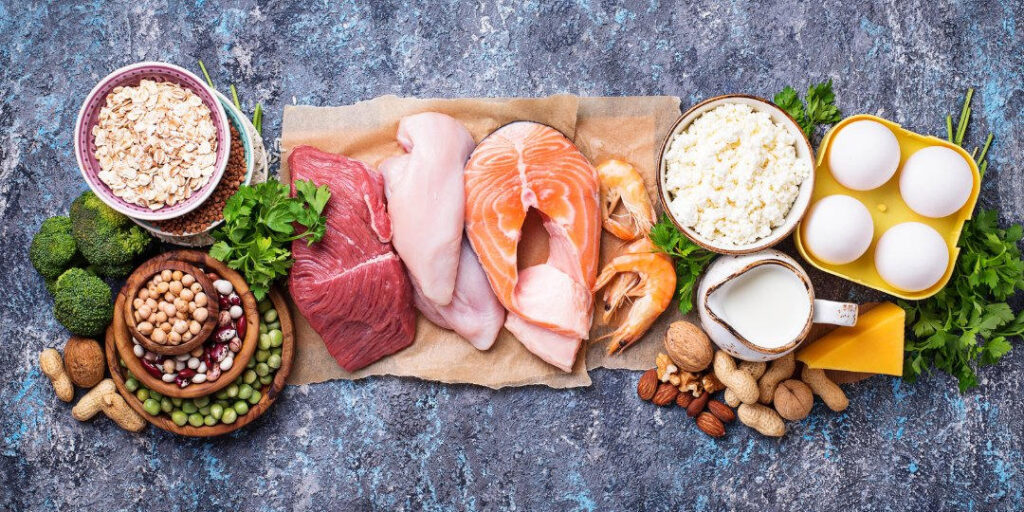About PROTEIN

About PROTEIN
by Julie Adams, RD
Protein in an essential macronutrient that performs a myriad of functions from structural support to acting as enzymes and hormones. Protein is important for oxygen transport, fluid balance, and the absorption of nutrients. Deficient protein intake can increase the risk of muscle loss, blood sugar imbalance and decreased immune function. In contrast, excessive protein intake can burden bones, kidneys and the liver, and is associated with an increased risk of coronary heart disease if sourced from foods high in saturated fat. So, how do you decide how much and what kind of protein you need? A licensed registered dietitian can assess your unique needs. In the meantime, here’s a general primer.
The right balance
A person’s protein requirement varies by health status, age, weight, gender, activity level, and health goals. The Recommended Dietary Allowance (RDA) for protein specifies that healthy adults need a modest 0.8 gram of protein per kilogram of body weight. For a 150-pound person, this equates to 55 grams of protein per day. It’s helpful to remember that the RDA is predicated on how much protein we need to live and avoid malnutrition, versus how much we need to thrive.
There is considerable debate regarding optimal protein intake. In general, healthy, moderately active individuals without underlying health conditions benefit from taking in something closer to 1.2 grams of protein per kilogram of body weight. With this in mind, the aforementioned 150-pound individual is now consuming 82 grams of protein per day. Hitting the gym hard most days of the week? Vigorous exercisers need closer to 1.4-2.0 grams of protein per kilogram of body weight, or 95-136 grams of protein per day. The same is true for middle-aged individuals, particularly women, to help preserve muscle mass. Ideally this is done in conjunction with a resistance training program.
Timing Matters
When protein is eaten is also important. Studies have shown that spacing protein intake evenly throughout the day helps the body utilize it more effectively. This is in contrast to most people’s habit of loading up on protein at the end of the day. Try to blanket your day with a serving of protein at each meal and snack. In
general, most adults benefit from 25-30g of protein per meal and 10-15 grams of protein per snack.
Pair it up
Including protein with meals helps slow the rate of sugar absorption and promotes satiety. It can prevent drastic blood glucose and coinciding insulin spikes by pairing protein with carbohydrates. This has been shown to blunt blood sugar levels versus eating carbohydrates alone.
Consider the Source
Choose high quality, lean sources of protein such as wild salmon, tofu, Greek yogurt, chicken and legumes. There is plenty of variety for omnivores, vegetarians and vegans alike. Avoid consuming red and processed meats, especially sausages, ham, bacon, salami and hotdogs that are known carcinogens. Rotate a variety of proteins to achieve an optimal mix of amino acids. Do not forget that plant-based proteins offer a bonus of dietary fiber that most people are lacking. Include portions of beans and legumes, bean or lentil-based pastas, seeds (e.g. chia, pumpkin, hemp), nuts (e.g. walnuts, almonds, cashews), and whole grains (e.g. quinoa, buckwheat, millet).
Protein gone too far
The popularity of low carb diets has led many to believe that there is no upper limit to protein intake. However, diets too high in protein can be associated with the risk of dehydration or impaired kidney function. We do not store protein as we do fat. Thus, chronic overconsumption of protein can overtax the kidneys responsible for filtering and excreting the inherent nitrogen load.
If you or someone you know would like to learn more about the profound effect nutrition has on health, please contact us today. We have a fantastic team ready to help you find variety and balance in your diet. MANY OF THESE SERVICES ARE LIKELY TO BE COVERED BY INSURANCE. Please call us at 224-407-4400 or email info@compgihealth.com
